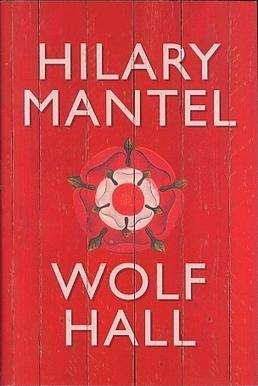Wolf Hall was at the top of the To Read and be Savored pile. A Christmas gift from a fellow book nerd friend, Wolf Hall has sat on my shelf since December of 2009. The novel is about Thomas Cromwell, born to an abusive blacksmith, Cromwell rises to power first as adviser to Cardinal Wolsey and then as an agent of Henry the VIII. As one who loves literary historical fiction (especially related to this time period) I knew I would love this novel. I finally decided that Wolf Hall was ready to be read this year. I've on my nightstand since January and it wasn't until November that I decided it was time for Wolf Hall.
I eagerly began reading and discovered....
I didn't like the book AT ALL.
Mantel switches point-of-view a great deal, meaning I found myself rereading passages to decipher who "he" could be and Mantel tends to switch between internal and external dialogue without making it clear to the reader. Let me clarify, it is beautifully written, but lacks the narrative ease of most historical fiction. I would say that most historical fiction is "plot-driven" or focused on describing historical "character"; Wolf Hall has an interesting plot and intriguing characters, but truly the writing is what shines.
Then I realized that my approach to Wolf Hall was completely wrong. I was reading it on lunch breaks or on the floor while Atticus played or when I was sleepy at night. Scratch that.... I followed a simple formula for The Reading of Wolf Hall and it worked, I loved the novel.
I present to you, instructions for reading Wolf Hall:
- Ideal conditions include the evening hours before you get sleepy. Grey and cold weather are a plus.
- Step one: tuck the kids in bed. Send the husband off to do something arty.
- Step two: Brew a large pot of tea. I would highly recommend Harney & Sons Fine Tea Tower of London blend.
- Step three: Sit in a comfy, but-not-too-comfy chair.
- Step four: Open book
- Step five: crawl into book
- Step six: live inside sixteenth century England for a solid two hours or more
- Step seven: reemerge, shake your head, and try to reacquaint yourself with new-fangled modernity



7 comments:
I've been saving this one as well, as you're not the first to tell me it's a book you have to take your time over. Hopefully someday soon...
Amen! It is definitely to be savored, and I think I read somewhere that the sequel is out/about to be out, but not quite a sequel. Kind of a necessary book between Wolf Hall and the sequel? I would tell you where I read that if my brain would come back (it's on Christmas prep overload at the moment). Must.go.buy.tea! :)
I love books like that. But yes you need time to crawl in them and live.
Except for the tea drinking, that is just how I read Wolf Hall. I read books on my breaks at work as well and you are right, only certain books can work in two or three 10 minute snatches a day. Based on my enjoyment of Wolf Hall I recently bought, but haven't read yet, Mantel's "A Place of Greater Safety" which takes place during the French Revolution. I am saving it for next year.
I love that you say "crawl into the book" Yes!
What I loved most about Wolf Hall was the way Mantel used the two opposing characters of Cromwell and More to illustrate conflicting views on the nature of law and government. Truly, it is the greatest book about "the law" I have ever read. The historical setting allows Mantel to explore two conflicting philosophies in a delicious, juicy, sensual way that makes you forget you are laboring in the birth of reformation.
"Wolf Hall" is a most complex, deftly written, original novel - but it is long - over 500 pages - and it is certainly not a fast read. This is a book, both vivid and real, which should be read slowly and savored. It doesn't deal with Henry's romantic inclinations and indulgences, glamorous fetes and progresses, etc. It doesn't even touch on Anne Boleyn's beheading. The main theme here is how to obtain power and wield it. There is little heroism or idealism here.
"Listening to a disgruntled earl pontificate about 'ancient rights,' Cromwell wonders how he can explain real life to this clueless nobleman. 'The world is not run from where he thinks. Not from his border fortresses, not even from Whitehall. The world is run from Antwerp, from Florence, from places he has never imagined . . . not from castle walls, but from countinghouses, not by the call of a bugle but by the click of the abacus
Post a Comment